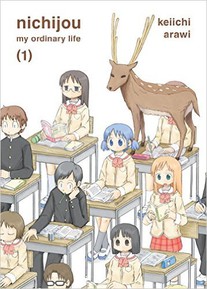Review
by Rebecca Silverman,Nichijou
GN 1
| Synopsis: |  |
||
In an ordinary suburban town at an ordinary school, students go about their ordinary lives. Nano is a teenage robot built by a capricious child inventor who just wants her classmates to think she's normal, Mio doodles explicit yaoi in her spare time, Yuuko never does her homework but has seen the principal wrestle with a deer…ordinary, as it turns out, is all in the eye of the beholder in this goofy slice-of-life story. |
|||
| Review: | |||
Nichijou, also known as My Ordinary Life, has had a long road to continuous publication in English. First licensed by Bandai, then briefly released digitally by JManga, it now at last has found a reliable home at Vertical, and this first volume shows why it was worth the fuss for what at it must be admitted doesn't sound like an exceptional title at first glance. Nichijou follows the lives of a group of high schoolers (with a focus on the girls) as they simply go through their days. But this is more than another “cute girls doing cute things in cute ways” series; despite the title, their lives are anything but what we'd call “ordinary.” In fact, this illusion is dispelled on the very first page, when Nano is introduced as a robot and proceeds to wreak havoc on other students commuting to school by running too fast and losing parts of her body…including some “special extras” that her mad scientist creator has added. Nano takes all of this is relative stride until her hand goes flying – despite the fact that she has a huge wind-up key sticking out of her back, she really seems to believe that none of her classmates know that she's not human. (They all know.) While Nano doesn't get the majority of the pages in this book – Yuuko gets that honor – her story is the one that reminds us that comedy can be a pretty cruel genre. Its literary definition can be simplified to encouraging us to laugh at the misfortunes of others, and that almost goes a bit too far with the way that Nano's creator, a little girl known simply as “Professor” adds gags, food, and reactions to Nano without her knowledge. Nano is not in charge of her own body, and if she was less human in her view of herself, that would be less of an issue; as it stands, the last chapter of the book reads more “mean” than “funny,” although Arawi's visual references to other (generally older) manga are a great touch. Yuuko, the character with the most chapters devoted to her, is introduced as an ordinary high school girl (cheerful), while her friend Mio is introduced as (normal). These distinctions are only tangentially related to the girls' actions and reactions, with Yuuko often forgetting her homework and hatching a crazy scheme (or just trying to bum notes off of Mio) and Mio's overreactions rivaling Yuuko's at times. Yuuko's perpetual position in the hallway as punishment – which she remarks is kind of old-fashioned in one of the manga's more self-aware moments – does put her in the position to observe other students' and teachers' antics, with the highlight definitely being the principal wrestling with a small stag. This is basically how Nichijou operates – moments of insanity swaddled in more average high school comedy fare. It works quite well, largely because Arawi is able to make jokes in the artwork as well as the text. We see this best in the dialog-free chapter nine, where Mio and Yuuko are struggling to build a card house while Mai, their straight-faced classmate, absently does her best to thwart them. The conclusion of the story is unexpected and a well-done gag and the whole chapter is generally a nice piece of comedic construction. Arawi clearly knows his genres and melds them well, making this a book that should appeal more to those who don't usually like slice-of-life stories. That said, there isn't a lot of plot to it. Nichijou is simply about telling silly stories about the people in a particular town, and most of us, robots or not, don't do anything all that fascinating on a daily basis. Yuuko's Ferris Bueller-style plot to avoid her exams is one of the higher points, as is Mio's inadvertently assisting a mochi-headed man, but most of the stories are about very slight things and don't connect to each other except tangentially. Vertical has also not included any translation notes, which is a bit of an issue at times, although most things can be figured out through context; if you like precise answers about unfamiliar words and objects, however, they aren't there. Nichijou's first volume shows why so many publishers have wanted to take a chance on it. While slice-of-life isn't for everyone, comedy notwithstanding, this is a particularly fun book with plenty of randomness, visual references to older series, and a cast of likeable characters who are just a little bit off the wall. If you're looking for a new light comedy that doesn't require too much thought but is generally a good time, look no further. |
| Grade: | |||
|
Overall : B+
Story : B
Art : B+
+ Funny and entertaining, Arawi gets a lot of mileage out of a deceptively simple art style. Some nice surprise moments. |
|||
| discuss this in the forum (15 posts) | | |||
| Production Info: | ||
|
Full encyclopedia details about Release information about |
||